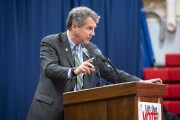
Six years ago, my friend and former colleague Victoria Finkle wrote a magazine story about how, ten years on, the Great Financial Crisis was
Over the last four months or so, the Washington bureau of American Banker has been working on a podcast series about how populism — that is, the political frame of favoring the pure working masses against the corrupt elite — informs seemingly every facet of financial regulation, from the
Populism is, of course, not new. The term itself dates to the People's Party of the late 19th century, which was a largely agrarian movement that called for, among other things, fiat currency and federal regulation of the railroads. Both of those things ended up happening, though not for a long time and not because People's Party candidates won elections.
So the political framing of mustachioed elites in spats kicking dirt in the eyes of Joe Sixpack is ancient and powerful, but it is also vague. Because it is vague, who plays the role of the downtrodden worker and who is the corrupt elite is subject to wide interpretation. In the post-2008 world, bankers were widely seen as indifferent to downside risks posed by overleveraging themselves with financial instruments they knew to be trash, and were rewarded for that indifference by being bailed out while millions lost their homes and saw their credit ruined. Dodd-Frank and Basel III — and much of what has followed since — are policy answers to that outrage.
But there is a Republican strain of populism that has been gaining traction in the form of politicians like Sens.
In other words, populism — doing something because the people need it and demand it — at some level is the answer to why anyone does anything in financial regulation, and because the trauma of 2008 is still alive, people are still receptive to those arguments. For many Americans, it is not hard to believe that there are still elites out there trying to pick their pocket.
The problem is that, almost as a rule, the big questions and problems in financial regulation have a greater burden of complexity than populism can credibly bear. For example: What is an appropriate level of bank capital for banks to retain? We know that zero is too low and 500% is too high, but where one meets in the middle is — or should be — the product of careful analysis and compromise, not a battle between good and evil. But because people who vote are, for the most part, in favor of good and against evil, you can further your agenda by couching this or any other debate in those terms.
Populism, then, has evolved from an exercise in giving the people what they need and want at the expense of the elites into elites using the people to get what they want. The truth, I suspect, is that what the people really want is to not have to think about any of this anymore.






